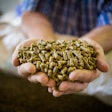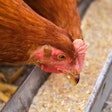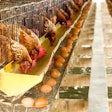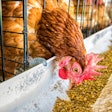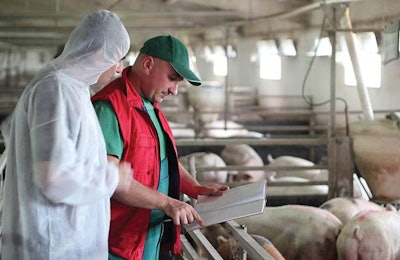
Intensively farmed livestock are continuously exposed to pathogenic organisms, resulting in the constant activation of their immune system. At best, this stimulates their immune system, but the opposite is also possible. In the latter case, this activation induces either a clinical or sub-clinical form of disease status that reduces the biological and economic efficiency of protein accretion and daily weight gain. At the same time, this inefficiency in protein accretion rate increases nutrient excretion, especially that of nitrogen, which is now considered an environmental pollutant.
Proper functioning of the immune system is absolutely critical to livestock survival and well-being.
The proper functioning of the immune system is absolutely critical to livestock survival and well-being. At the same time, the activation of the immune system is also responsible for the reduction in carcass protein deposition, as clearly observed in sick livestock. Provision of the correct nutrients, especially amino acids, for the immune system can enhance its function during times of stress while simultaneously minimizing detrimental effects on tissue growth.
In general, it is well documented that nutrition can play a substantial role in disease prevention or alleviation of its symptoms. Nutritional supplements that prevent the establishment of diseases have long been used in commercial practice. These include well-known compounds like zinc oxide, copper sulfate and antibiotics. More recent nutritional strategies direct their efforts in maximizing or supplementing the host immune system’s overall response. Examples include several yeast products and antibody-bearing ingredients such as hyper-immunized eggs. In addition, dietary nutrient manipulation is considered essential in the face of disease because it is now widely recognized that diseased livestock do not have the same nutrient requirements as healthy ones. This is most important in the case of amino acids.
Diseased livestock do not have the same nutrient requirements as healthy ones.
Disease affects metabolism and requirements
Exposure to pathogenic antigens triggers the host immune system and results in the release of pro-inflammatory cytokines (proteins that modulate the immune response and overall metabolism). The most important cytokines are interleukin-1 (IL-1), IL-6 and tumor necrosis factor alpha (TNF-α). Activation of the immune system by these cytokines not only depresses appetite but also reduces muscle protein synthesis and increases muscle protein degradation (lower protein accretion rate). At the same time, synthesis of acute phase proteins in the liver are stimulated, leading to a totally different pattern of amino acid requirements. Thus, the normal metabolic state is switched from anabolism (protein deposition) and growth in healthy livestock to catabolism and muscle loss in diseased livestock. Consequently, nitrogen excretion is greatly increased at the expense of muscle protein. This metabolic alteration is considered essential for the success of the immune system response because nutrients are redistributed away from growth to support of immune system functions to control pathogenic invasion of organisms.
Amino acid needs during disease challenge
It is clear now that when the immune system is activated in the presence of a pathogen, metabolism is directed towards the synthesis of immune system compounds. The nutrient requirements for these processes are quite different than requirements for normal growth. However, there is a paucity of information regarding the nutrient requirements of livestock under a disease challenge because existing estimates have been traditionally derived from dose-titration experiments with healthy livestock reared under optimal conditions.
The immune system has its own unique set of nutritional requirements, which can differ from the rest of the body. For instance, acute-phase proteins produced by the liver in response to cytokines have a different amino acid composition than skeletal muscle proteins. The aromatic amino acids (phenylalanine, tyrosine and tryptophan) are found in large concentrations in acute phase proteins that are produced in massive quantities in the liver at the onset of disease. It has actually been suggested that excessive muscle degradation is due to the differences in the amino acid profile between muscle protein and acute phase proteins. Threonine is a major component of immunoglobulin-G (IgG), and higher dietary concentrations of threonine are required for antibody production than for body growth in animals. Additionally, immunological stress causes an increase in amino acid maintenance needs as a proportion of total requirement. Thus, methionine, cysteine and threonine requirements may be increased relative to lysine in livestock challenged by disease.
Unfortunately, today this knowledge is purely based on qualitative experimentation. It is left up to practicing nutritionists to evaluate field conditions and apply nutrient intervention strategies according to their own estimates. Quantifying health status is the most critical step in establishing a nutrient specifications matrix for livestock under commercial conditions.





